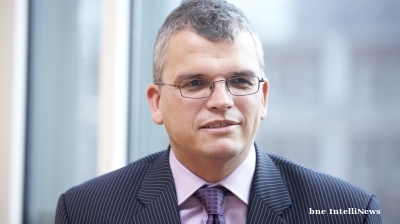The seasonally adjusted IHS Markit Russia Services Business Activity Index fell heavily from a month earlier to 53.7 in September after posting 58.2 in August, but still signalled a solid expansion in output.
The latest index reading rounded off a strong quarter for Russian services that bounced back after a record-breaking collapse in the first quarter of this year caused by the coronacrisis. The quarterly average for the service sector picked up to its highest level since the opening three months of 2017.
The fall in the services PMI was in parallel with a fall in the manufacturing PMI that was released a few days ago and saw the headline seasonally adjusted manufacturing PMI fall back below the 50 no-change market to 48.9 in September, down from 51.1 in August.
The contraction in manufacturing was caused by a general souring of sentiment after oil prices slipped back from c.$45 to c$40 and the ruble dropped heavily from cRUB72 to the dollar to close to RUB80 at the end of September on renewed global risk fears.
Russia has suffered from the proverbial perfect story, as domestically it became embroiled in propping up the regime of Belarus' self-appointed President Alexander Lukashenko and the Kremlin was accused of trying to poison anti-corruption blogger and opposition activist Alexei Navalny with Novichok. The coronavirus (COVID-19) infection rates surged, with daily infections doubling from c5,000 new cases a day to over 10,000 – their highest level since the peak of the pandemic in the summer.
Taken together and the decline in the services and manufacturing PMIs dragged down the IHS Markit Composite PMI Output Index, which dropped to 53.7 in September from 57.3 in August, but was still above the 50 no-change mark.
Given the pressure on the economy caused by a falling ruble and sinking oil prices, Markit concluded that the ongoing growth in both services and the composite index was a good result and highlighted that it shows the Russian economy is coping far better with the current crisis than the previous big crises.
Services grow on domestic demand but managers remain cautious
The softer rise in output was often linked to slower but still sustainable new business growth. Total sales were primarily supported by domestic demand, as new export orders continued to decline.
But given the brouhaha, managers remain nervous even if their businesses are still growing. Concerns regarding the longevity of the recovery weighed on business confidence, which dropped to a three-month low after a sharp pick-up in recent months.
The practical upshot of these nerves was that companies were still shedding workers and keeping operations lean. Unemployment has risen from a post-Soviet low of 4.2% last year to 6.4% as of September, but seems to have stabilised at this level. Without stronger demand firms are not willing to start hiring new workers for the moment, says Markit.
Inflation remains subdued and the rate of input price inflation was unchanged from August. Firms partially passed on higher costs to clients through a solid rise in selling prices. Inflation was running at 3.6% in August, which is still below the Central Bank of Russia (CBR) target rate of 4%, but prices are anticipated to rise in the autumn, driven by seasonal firming food costs.
Markit also reported that average costs for firms increased at a sharp pace that matched that seen in August and the rate of inflation was the joint-quickest for six months, as firms linked input price rises to greater utility and supplier costs, alongside the unfavourable exchange rate movements.
New business growth was solid overall at the end of the third quarter. Firms continued to note that new client wins and the resumption of operations at customers drove the upturn in new sales, said Markit.
“That said, the rate of increase slowed to a three-month low. New export orders continued to weigh on total sales, with new business from abroad falling for the seventh month running, and at a solid pace,” said Markit.
Companies said they had enough workers to cope with the level of work and backlogs of work continued to decline at a faster pace.
Data

Belarus reports modest GDP growth 1.6% in 8M25
Belarus’ economy expanded by 1.6% in the period from January to August 2025, according to preliminary estimates from the National Statistical Committee, state news agency BelTA reported on 17 September.

Most Ukrainians reject Russian peace plan, back continued resistance, poll shows
An overwhelming majority of Ukrainians remain committed to resisting Russia’s invasion and reject Moscow’s latest peace proposals, even as many recognise that the war is unlikely to end soon, according to a new survey by the KIIS.

Young Bulgarians turn to stocks over real estate, survey shows
Real estate remains the most popular option overall but younger investors are leading a shift towards stock market investing, says survey commissioned by Revolut.

State of global democracy - Statista
The Economist Democracy Index rates countries on the state of their governing system each year. In the latest edition, corresponding to the year 2024, only 25 countries (6.6% of the world's population) have been rated as "full democracies"



